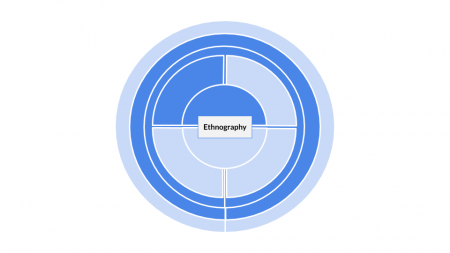Difference between revisions of "Ethnography"
KatharinaK (talk | contribs) |
KatharinaK (talk | contribs) |
||
| Line 14: | Line 14: | ||
|} | |} | ||
<br/>__NOTOC__ | <br/>__NOTOC__ | ||
| + | <br> | ||
=== Short Definition === | === Short Definition === | ||
| − | Ethnography can be regarded one of the most important qualitative research methods that looks back at a long tradition but also transitions. Deriving from the discipline anthropology, ethnology is vital for social sciences, although today it cannot be equated with one specific disciplinary background. Brewer defines ethnography as “the '''study of people''' in naturally occurring settings or ‘'''fields'''’ by methods of data collection which capture their social meanings and ordinary activities, involving the researcher '''participating''' directly in the setting, if not also the activities, in order to collect data in a systematic manner but without meaning being imposed on them externally.” (2) | + | Ethnography can be regarded one of the most important qualitative research methods that looks back at a long tradition but also transitions. Deriving from the discipline anthropology, ethnology is vital for social sciences, although today it cannot be equated with one specific disciplinary background. Brewer defines ethnography as “the '''study of people''' in naturally occurring settings or ‘'''fields'''’ by methods of data collection which capture their social meanings and ordinary activities, involving the researcher '''participating''' directly in the setting, if not also the activities, in order to collect data in a systematic manner but without meaning being imposed on them externally.” (2)<br> |
| + | === Background === | ||
| + | ==== Criticism ==== | ||
| + | === How the method works === | ||
| + | === Stregths & Challenges === | ||
| + | === References === | ||
| + | (1) Atkinson, Paul/Delamont, Sara/Coffey, Amanda (2007): Handbook of Ethnography. London/ThousandOaks/New Delhi: Sage. | ||
| + | (2) Brewer, John D. (2000): Ethnography | ||
| + | |||
---- | ---- | ||
Revision as of 07:56, 28 August 2020
| Method categorization | ||
|---|---|---|
| Quantitative | Qualitative | |
| Inductive | Deductive | |
| Individual | System | Global |
| Past | Present | Future |
Short Definition
Ethnography can be regarded one of the most important qualitative research methods that looks back at a long tradition but also transitions. Deriving from the discipline anthropology, ethnology is vital for social sciences, although today it cannot be equated with one specific disciplinary background. Brewer defines ethnography as “the study of people in naturally occurring settings or ‘fields’ by methods of data collection which capture their social meanings and ordinary activities, involving the researcher participating directly in the setting, if not also the activities, in order to collect data in a systematic manner but without meaning being imposed on them externally.” (2)
Background
Criticism
How the method works
Stregths & Challenges
References
(1) Atkinson, Paul/Delamont, Sara/Coffey, Amanda (2007): Handbook of Ethnography. London/ThousandOaks/New Delhi: Sage. (2) Brewer, John D. (2000): Ethnography
